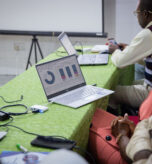Nigeria has struggled with high maternal, newborn, and child mortality rates, particularly in underserved and rural communities. To address this, the National Primary Health Care Development Agency (NPHCDA) launched the Expanded Midwives Service Scheme (eMSS) to increase the availability of Skilled Birth Attendants (SBAs) in targeted health facilities across Nigeria’s 36 states and the Federal Capital Territory.
The objective of eMSS is to ensure that a sufficient number of nurse/midwives and Community Health Extension Workers (CHEWs) are recruited, trained, and deployed to support the delivery of a quality Minimum Service Package at the primary healthcare level.
This initiative forms part of the broader Primary Health Care revitalization effort to achieve Universal Health Coverage (UHC) by 2026.
Strategy Design & Implementation
The eMSS project’s strategy was designed with a multi-layered approach focusing on the recruitment, training, and management of SBAs to ensure both immediate and sustained impacts on healthcare delivery:
Recruitment and Selection: Over 1,977 SBAs, including nurse/midwives and CHEWs, were recruited across all 36 states, ensuring local representation and relevance to the communities they would serve.
Facility Targeting: Strategic selection of primary healthcare facilities for SBA deployment maximized the impact on maternal and child health outcomes in underserved areas.
Comprehensive Workforce Management: A management and supervision strategy was implemented to monitor SBA performance, attendance, and adherence to service standards. Timesheets and attendance records were meticulously processed and submitted to NPHCDA for compensation processing, ensuring accountability and motivation among SBAs.
Ongoing Training and Development: SBAs underwent continuous professional development, equipping them with the skills necessary for quality maternal, newborn, and child health service delivery.
Result
Through the eMSS strategy, the NPHCDA made significant progress in improving maternal and child health service accessibility. The recruitment and deployment of nearly 2,000 SBAs across Nigeria’s primary healthcare centers contributed to improved healthcare outcomes, with better support for mothers and newborns. Enhanced SBA management practices, rigorous supervision, and a structured compensation system underscored the project’s sustainability, helping to drive the success of Nigeria’s broader UHC goals. The successful completion of recruitment, the robust facility selection, and the effective performance management framework set a strong foundation for continuous service improvements in maternal and child health across the country.




